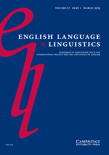
English Language & Linguistics
Scope & Guideline
Unveiling the Nuances of Linguistic Research
Introduction
Aims and Scopes
- Historical Linguistics:
The journal extensively explores the evolution of the English language, examining changes in syntax, morphology, and semantics across different historical periods. - Sociolinguistics:
Research in this area emphasizes the social dimensions of language use, focusing on dialect variation, language attitudes, and the impact of societal changes on English. - Pragmatics and Discourse Analysis:
Papers often investigate the pragmatic aspects of language, including how meaning is constructed in context and the role of discourse markers in communication. - Corpus Linguistics:
The journal promotes the use of corpus-based methodologies to study linguistic variation and change, providing empirical data to support theoretical claims. - Cognitive Linguistics:
Research reflects the cognitive processes underlying language use, examining how language interacts with thought and perception. - World Englishes:
A significant focus on the varieties of English spoken globally, addressing issues of identity, globalization, and linguistic variation.
Trending and Emerging
- Digital Communication and Social Media:
Increasing research on language use in digital contexts, including social media interactions, reflects the growing relevance of technology in shaping modern English. - Multimodality:
Emerging studies that consider the interplay of linguistic and non-linguistic elements in communication indicate a trend towards understanding language in a broader semiotic context. - Language and Identity:
Growing interest in how language constructs and expresses identity, particularly in multicultural and multilingual contexts, reveals the importance of sociolinguistic factors in contemporary research. - Construction Grammar:
An upswing in research applying construction grammar approaches suggests a shift towards understanding language as a network of constructions rather than isolated rules. - Cognitive and Neuroscientific Approaches to Language:
There is an increasing trend towards integrating cognitive science and neuroscience with linguistic research, exploring how language processes occur in the brain.
Declining or Waning
- Traditional Syntax:
Research on traditional syntactic structures has seen a decrease, as newer methodologies and frameworks, such as construction grammar, gain traction. - Historical Dialectology:
Though still relevant, studies specifically centered on historical dialects have become less frequent, with a shift towards broader sociolinguistic perspectives. - Prescriptive Grammar:
The focus on prescriptive approaches to grammar appears to be waning, as the journal increasingly favors descriptive and usage-based analyses. - Static Language Models:
Older models that treat language as a static system are being replaced by dynamic, usage-based perspectives that account for language change and variability.
Similar Journals
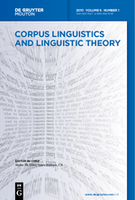
Corpus Linguistics and Linguistic Theory
Exploring the intersection of theory and corpus methodologies.Corpus Linguistics and Linguistic Theory, published by DE GRUYTER MOUTON, is a premier academic journal dedicated to advancing the interdisciplinary field of linguistics through the lens of corpus-based research methodologies. With an ISSN of 1613-7027 and E-ISSN 1613-7035, this journal is a valuable resource for linguists, researchers, and students who aim to investigate language structures, usage, and their theoretical implications. Recognized as a Q1 journal in the realm of Linguistics and Language, it boasts impressive Scopus rankings, positioning it within the top 7% and 8% of its categories in the Arts and Humanities and Social Sciences, respectively. Its relevance is underscored by a commitment to publishing rigorous research from 2005 to 2024, addressing contemporary advancements in linguistic theory fueled by empirical data. While the journal is not open access, it remains an essential platform for disseminating high-quality scholarship that informs both theoretical perspectives and practical applications in linguistics. As such, Corpus Linguistics and Linguistic Theory plays a crucial role in shaping the future of linguistic studies, making it indispensable for anyone engaged in this dynamic field.

Linguistics Vanguard
Exploring the nuances of language and communication.Linguistics Vanguard is a premier academic journal dedicated to advancing research in the field of linguistics and language studies, published by the esteemed Walter de Gruyter GmbH. With its impact factor placing it in the Q1 category for Linguistics and Language as of 2023, the journal demonstrates a significant influence in the academic community, boasting a Scopus rank of #194 out of 1088 in Arts and Humanities and a commendable percentile of 82. Since its inception in 2015, the journal has served as a critical platform for disseminating innovative research and fostering dialogue among scholars and practitioners, encapsulating a wide range of topics within linguistics. Despite being a subscription-based publication, it maintains an open approach to scholarship, encouraging robust academic exchange. Located in Berlin, Germany, at Genthiner Strasse 13, D-10785, Linguistics Vanguard is a must-read for those seeking to stay at the forefront of linguistic research and theory.
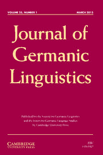
Journal of Germanic Linguistics
Exploring the Depths of Germanic LanguageThe Journal of Germanic Linguistics, published by Cambridge University Press, is a premier academic journal dedicated to advancing scholarship in the field of linguistics with a particular focus on Germanic languages. With an impressive impact factor and a well-established reputation, this journal attracts contributions from leading researchers and professionals who delve into the complexities of language, syntax, semantics, and phonology. The journal holds a prominent position in its category, recognized as Q2 in Linguistics and Language and Q1 in Literature and Literary Theory according to latest rankings. By fostering innovative research, the Journal of Germanic Linguistics plays a crucial role in shaping the discourse around Germanic linguistics, providing an essential platform for both emerging scholars and seasoned academics alike. Although it does not offer Open Access options, it continues to be a vital resource for the global academic community, with a convergence of works published throughout its history from 2001 to 2007 and again from 2009 to 2024, ensuring an enriching repository of research for future generations.

LINGUISTIQUE
Fostering Scholarly Discourse in Language ScienceLINGUISTIQUE, an esteemed journal published by PRESSES UNIV FRANCE, serves as a vital platform for scholarly discourse in the fields of linguistics and language studies. With its ISSN 0075-966X and E-ISSN 2101-0234, this French journal has been a significant contributor to the understanding of linguistic phenomena since its inception in 2004, and it continues its journey through to 2024. Although currently categorized in the Q4 quartile for both Arts and Humanities (miscellaneous) and Linguistics and Language, its commitment to publishing quality research encourages a diverse range of articles, reviews, and innovative studies. Positioned in the 32nd and 29th percentiles for its respective fields according to Scopus rankings, LINGUISTIQUE is dedicated to advancing knowledge and stimulating engagement among researchers, professionals, and students alike. While it does not offer open access, the journal remains an essential resource for those who seek to deepen their understanding of linguistic principles in a global context, facilitating a richer discourse that connects theory with practice.
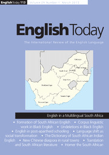
English Today
Fostering Academic Excellence in Language ResearchEnglish Today is a premier academic journal published by Cambridge University Press, renowned for its contributions to the field of linguistics and language since its inception in 1985. With an impressive impact factor and categorized in the top Q1 quartile for both linguistics and language categories, it ranks notably within the 84th percentile for Arts and Humanities and 82nd percentile for Social Sciences in Scopus rankings. The journal serves as a vital platform for researchers, professionals, and students, offering cutting-edge research, insightful reviews, and critical discussions on contemporary issues in English language studies. Although it is not open access, the journal maintains a commitment to academic rigor and relevance, making it an essential resource for those dedicated to advancing their understanding of English language dynamics and its implications in various socio-cultural contexts. With its editorial board comprising leading experts, English Today promises to continue shaping the discourse in linguistics and language studies through to 2024 and beyond.
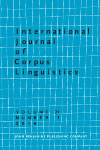
International Journal of Corpus Linguistics
Empowering Scholars to Decode LanguageThe International Journal of Corpus Linguistics, published by John Benjamins Publishing Co, is a premier academic journal dedicated to advancing the field of corpus linguistics. With an ISSN of 1384-6655 and an E-ISSN of 1569-9811, this journal serves as a pivotal platform for researchers and practitioners alike to explore the intricate relationships between language and corpora. Housed in the Netherlands and operating within the prestigious Q1 category in Linguistics and Language, the journal boasts impressive Scopus rankings, positioning it in the top percentiles of both Arts and Humanities and Social Sciences. Its commitment to rigorous peer-reviewed scholarship not only enhances understanding in the domain but also fosters collaboration among scholars. With coverage spanning from 1996 to 2024, the journal publishes cutting-edge research that contributes valuable insights into linguistic patterns and empirical studies. Whether you're an established researcher or a student embarking on your academic journey, the International Journal of Corpus Linguistics is an essential resource for anyone seeking to deepen their understanding of language through corpora.
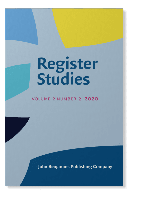
Register Studies
Decoding the Complexity of Language UseRegister Studies is an innovative and vital journal dedicated to the exploration of linguistic registers and variability in language use across diverse contexts. Published by John Benjamins Publishing Co, this journal serves as an essential resource for researchers and professionals in the fields of linguistics, sociolinguistics, and communication studies. With its emphasis on empirical research and theoretical advancements, Register Studies aims to uncover the nuances of language in social interaction, providing a platform for high-quality scholarly work. Although specific accessibility options are not outlined, the journal adheres to rigorous academic standards and strives to contribute significantly to the understanding of language's role in society. By fostering an interdisciplinary dialogue, Register Studies equips students, researchers, and educators with the insights necessary to navigate and contribute to the ever-evolving landscape of language studies.

Cadernos de Estudos Linguisticos
Fostering collaboration in the realm of linguistic research.Cadernos de Estudos Linguisticos, published by UNIV ESTADUAL CAMPINAS, INST ESTUDOS LINGUAGEM, stands as a pivotal platform in the field of linguistic studies since its inception in 1978. With its commitment to Open Access, this journal fosters the dissemination of cutting-edge research, ensuring that knowledge is accessible to a global audience. This also enhances collaboration among researchers, professionals, and students dedicated to exploring the nuances of language. The journal proudly carries the ISSN 0102-5767 and E-ISSN 2447-0686, attesting to its uninterrupted quality and relevance in linguistic scholarship. By addressing various facets of language studies, including syntax, semantics, and sociolinguistics, this esteemed journal is a vital resource for advancing understanding and innovation in the field.

Glossa-A Journal of General Linguistics
Exploring the Frontiers of Linguistic KnowledgeGlossa: A Journal of General Linguistics, published by the Open Library of Humanities, stands as a leading voice in the realm of linguistic research since its inception in 2016. With its Q1 category ranking in Linguistics and Language and impressive Scopus ranks encompassing the top 83rd and 81st percentiles in its respective fields, Glossa fosters a vibrant academic community committed to the rigorous exploration of language and linguistic theory. Operating under an open access model, the journal not only enhances the visibility of groundbreaking research but also ensures that valuable insights are accessible to a global audience. The journal's commitment to interdisciplinary dialogue makes it an indispensable resource for scholars, professionals, and students eager to engage with contemporary developments in linguistics. As it converges into 2024, Glossa continues to champion innovative scholarship and critical discourse that challenges conventional boundaries within the field.

Yuyan Kexue-Linguistic Sciences
Illuminating Language Through Interdisciplinary InsightsYuyan Kexue-Linguistic Sciences, published by SCIENCE PRESS, is a pivotal academic journal dedicated to the field of linguistics. With its ISSN of 1671-9484, this journal seeks to explore and illuminate various linguistic phenomena, contributing significantly to the understanding of language in both theoretical and applied contexts. Emphasizing interdisciplinary research, it welcomes contributions that bridge linguistics with areas such as cognitive science, sociology, and communication studies. Although it currently does not offer open access, Yuyan Kexue-Linguistic Sciences aims to provide a platform for researchers, professionals, and students alike to engage with cutting-edge studies and emerging trends in linguistics. Its publication location in Beijing positions it as a vital contributor to the global discourse in the linguistic sciences, catering to both a national and international audience. As the journal continues to grow, it aspires to maintain high academic standards and foster scholarly exchange for years to come.